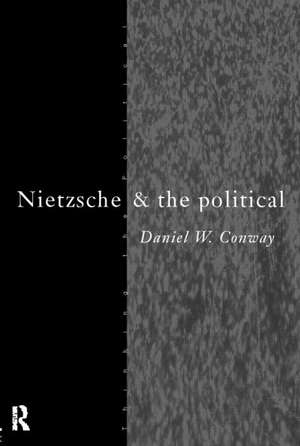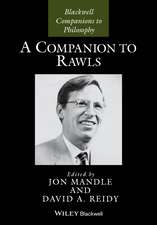Nietzsche and the Political: Thinking the Political
Autor Daniel Conwayen Limba Engleză Paperback – 12 dec 1996
The key contemporary figures such as Habermas, Foucault, McIntyre, Rorty and Rawls are also examined in the light of Nietzsche's political legacy. Nietzsche and the Political also draws out important implications for contemporary liberalism and feminist thought, above all showing Nietzsche's continuing relevance to the shape of political thinking today.
| Toate formatele și edițiile | Preț | Express |
|---|---|---|
| Paperback (1) | 444.08 lei 6-8 săpt. | |
| Taylor & Francis – 12 dec 1996 | 444.08 lei 6-8 săpt. | |
| Hardback (1) | 998.71 lei 6-8 săpt. | |
| Taylor & Francis – 12 dec 1996 | 998.71 lei 6-8 săpt. |
Din seria Thinking the Political
-
 Preț: 385.54 lei
Preț: 385.54 lei -
 Preț: 362.64 lei
Preț: 362.64 lei -
 Preț: 381.72 lei
Preț: 381.72 lei - 26%
 Preț: 246.33 lei
Preț: 246.33 lei -
 Preț: 363.00 lei
Preț: 363.00 lei -
 Preț: 363.00 lei
Preț: 363.00 lei -
 Preț: 375.97 lei
Preț: 375.97 lei -
 Preț: 349.71 lei
Preț: 349.71 lei -
 Preț: 366.30 lei
Preț: 366.30 lei
Preț: 444.08 lei
Nou
Puncte Express: 666
Preț estimativ în valută:
84.97€ • 88.96$ • 70.31£
84.97€ • 88.96$ • 70.31£
Carte tipărită la comandă
Livrare economică 05-19 aprilie
Preluare comenzi: 021 569.72.76
Specificații
ISBN-13: 9780415100694
ISBN-10: 0415100690
Pagini: 176
Dimensiuni: 156 x 234 x 14 mm
Greutate: 0.33 kg
Ediția:New.
Editura: Taylor & Francis
Colecția Routledge
Seria Thinking the Political
Locul publicării:Oxford, United Kingdom
ISBN-10: 0415100690
Pagini: 176
Dimensiuni: 156 x 234 x 14 mm
Greutate: 0.33 kg
Ediția:New.
Editura: Taylor & Francis
Colecția Routledge
Seria Thinking the Political
Locul publicării:Oxford, United Kingdom
Public țintă
UndergraduateCuprins
Introduction: Voyage of the Damned? 1. Political Perfectionism 2. The Uses and Disadvantages of Morality for Life 3. Perfectionism in the Twilight of the Idols 4. Regimes of Self-Overcoming: The Soul Turned Inside Out 5. The Philosopher's Versucherkunst 6. Comedians of the Ascetic Ideal 7. Nietzsche's Political Legacy
Descriere
Arguing that Nietzsche's political thinking is closer related to the conservative republicanism of his predecessors than to the progressive liberalism of his contemporaries, here Conway lays bare Nietzsche's political legacy.














